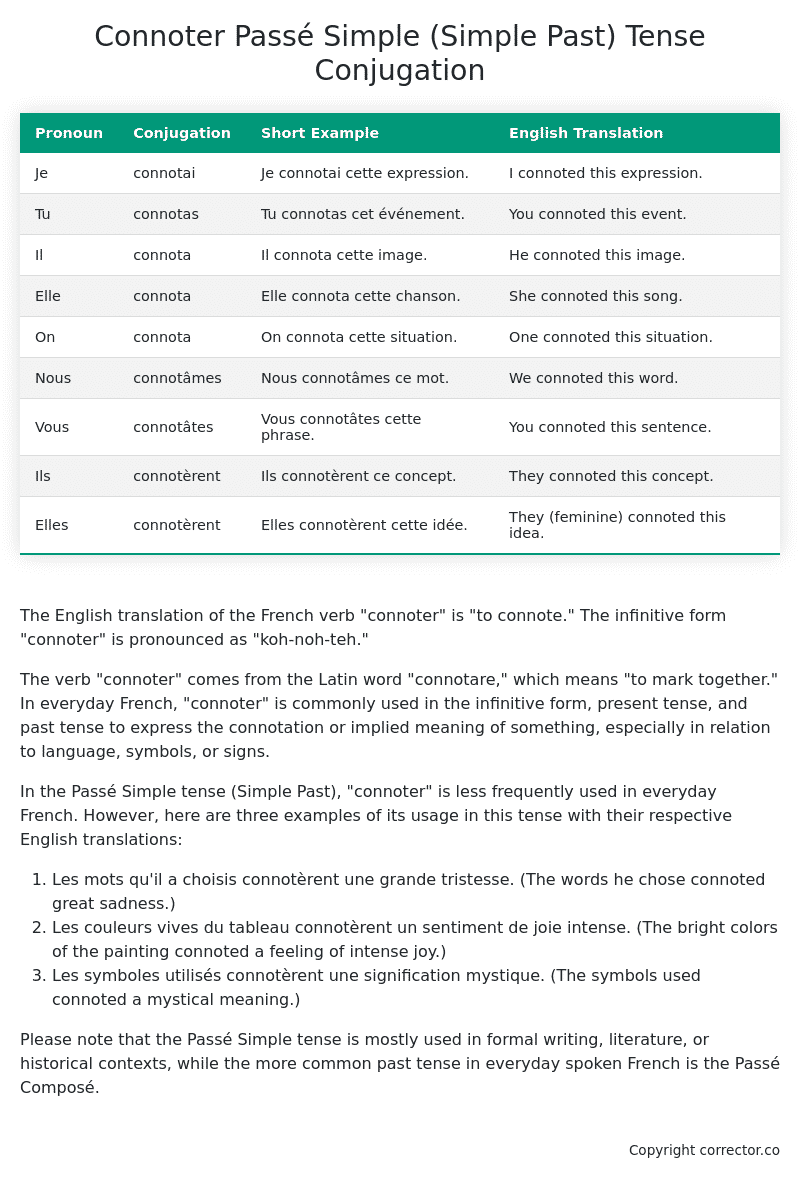Passé Simple (Simple Past) Tense Conjugation of the French Verb connoter
Introduction to the verb connoter
The English translation of the French verb “connoter” is “to connote.” The infinitive form “connoter” is pronounced as “koh-noh-teh.”
The verb “connoter” comes from the Latin word “connotare,” which means “to mark together.” In everyday French, “connoter” is commonly used in the infinitive form, present tense, and past tense to express the connotation or implied meaning of something, especially in relation to language, symbols, or signs.
In the Passé Simple tense (Simple Past), “connoter” is less frequently used in everyday French. However, here are three examples of its usage in this tense with their respective English translations:
- Les mots qu’il a choisis connotèrent une grande tristesse. (The words he chose connoted great sadness.)
- Les couleurs vives du tableau connotèrent un sentiment de joie intense. (The bright colors of the painting connoted a feeling of intense joy.)
- Les symboles utilisés connotèrent une signification mystique. (The symbols used connoted a mystical meaning.)
Please note that the Passé Simple tense is mostly used in formal writing, literature, or historical contexts, while the more common past tense in everyday spoken French is the Passé Composé.
Table of the Passé Simple (Simple Past) Tense Conjugation of connoter
| Pronoun | Conjugation | Short Example | English Translation |
|---|---|---|---|
| Je | connotai | Je connotai cette expression. | I connoted this expression. |
| Tu | connotas | Tu connotas cet événement. | You connoted this event. |
| Il | connota | Il connota cette image. | He connoted this image. |
| Elle | connota | Elle connota cette chanson. | She connoted this song. |
| On | connota | On connota cette situation. | One connoted this situation. |
| Nous | connotâmes | Nous connotâmes ce mot. | We connoted this word. |
| Vous | connotâtes | Vous connotâtes cette phrase. | You connoted this sentence. |
| Ils | connotèrent | Ils connotèrent ce concept. | They connoted this concept. |
| Elles | connotèrent | Elles connotèrent cette idée. | They (feminine) connoted this idea. |
Other Conjugations for Connoter.
Le Present (Present Tense) Conjugation of the French Verb connoter
Imparfait (Imperfect) Tense Conjugation of the French Verb connoter
Passé Simple (Simple Past) Tense Conjugation of the French Verb connoter (You’re reading it right now!)
Passé Composé (Present Perfect) Tense Conjugation of the French Verb connoter
Futur Simple (Simple Future) Tense Conjugation of the French Verb connoter
Futur Proche (Near Future) Tense Conjugation of the French Verb connoter
Plus-que-parfait (Pluperfect) Tense Conjugation of the French Verb connoter
Passé Antérieur (Past Anterior) Tense Conjugation of the French Verb connoter
Futur Antérieur (Future Anterior) Tense Conjugation of the French Verb connoter
Subjonctif Présent (Subjunctive Present) Tense Conjugation of the French Verb connoter
Subjonctif Passé (Subjunctive Past) Tense Conjugation of the French Verb connoter
Subjonctif Imparfait (Subjunctive Imperfect) Tense Conjugation of the French Verb connoter
Subjonctif Plus-que-parfait (Subjunctive Pluperfect) Tense Conjugation of the French Verb connoter
Conditionnel Présent (Conditional Present) Tense Conjugation of the French Verb connoter
Conditionnel Passé (Conditional Past) Tense Conjugation of the French Verb connoter
Conditionnel Passé II (Conditional Past II) Tense Conjugation of the French Verb connoter
L’impératif Présent (Imperative Present) Tense Conjugation of the French Verb connoter
L’impératif Passé (Imperative Past) Tense Conjugation of the French Verb connoter
L’infinitif Présent (Infinitive Present) Tense Conjugation of the French Verb connoter
L’infinitif Passé (Infinitive Past) Tense Conjugation of the French Verb connoter
Le Participe Présent (Present Participle) Tense Conjugation of the French Verb connoter
Le Participe Passé (Past Participle) Tense Conjugation of the French Verb connoter
Struggling with French verbs or the language in general? Why not use our free French Grammar Checker – no registration required!
Get a FREE Download Study Sheet of this Conjugation 🔥
Simply right click the image below, click “save image” and get your free reference for the connoter Passé Simple tense conjugation!

Connoter – About the French Passé Simple (Simple Past) Tense
Formation
Usage
Narration
Historical Context
Interactions with other tenses
Passé Composé
Imparfait
Conditional and Subjunctive
Summary
I hope you enjoyed this article on the verb connoter. Still in a learning mood? Check out another TOTALLY random French verb conjugation!


